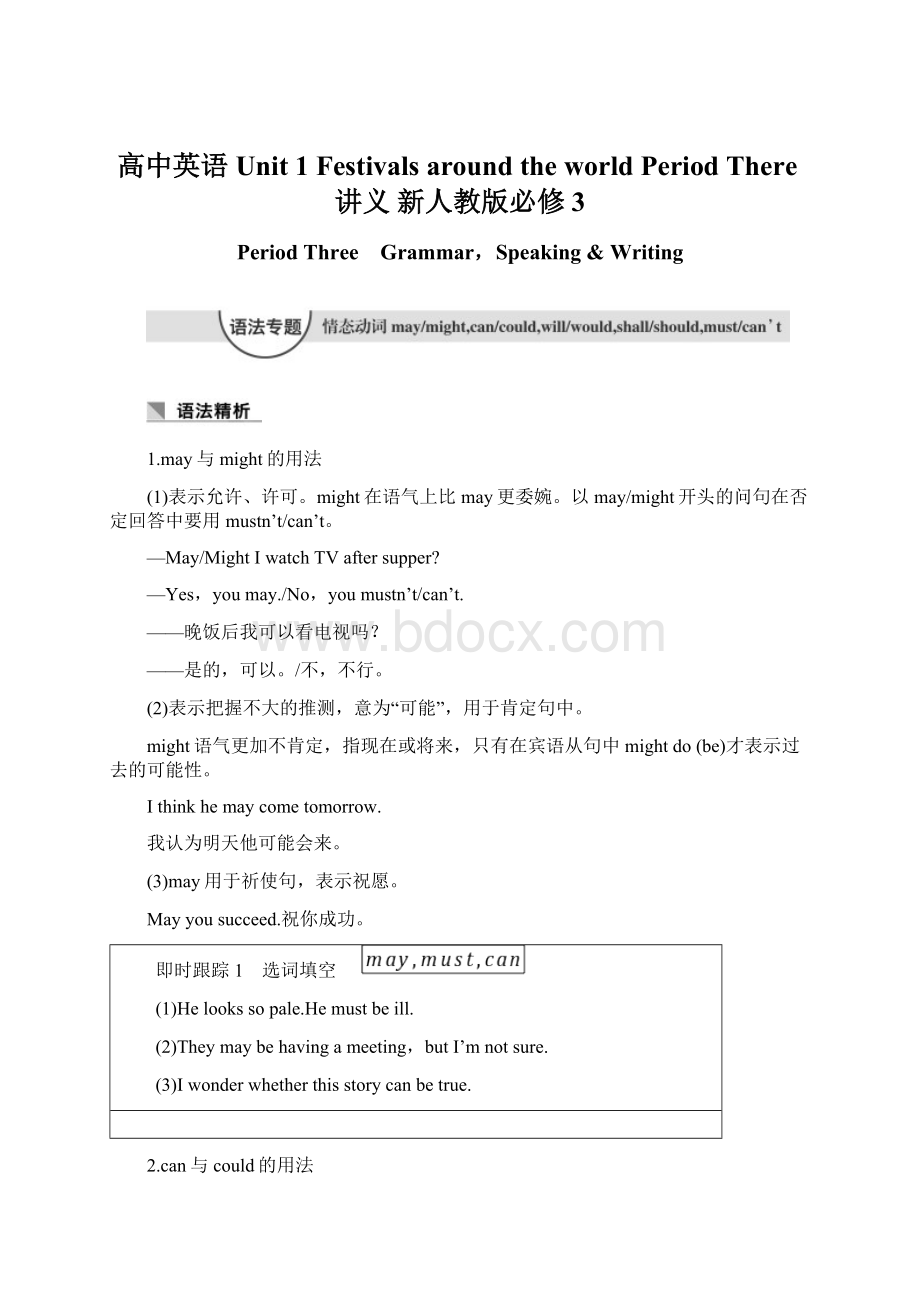 高中英语 Unit 1 Festivals around the world Period There讲义 新人教版必修3文档格式.docx
高中英语 Unit 1 Festivals around the world Period There讲义 新人教版必修3文档格式.docx
- 文档编号:17360153
- 上传时间:2022-12-01
- 格式:DOCX
- 页数:17
- 大小:94.43KB
高中英语 Unit 1 Festivals around the world Period There讲义 新人教版必修3文档格式.docx
《高中英语 Unit 1 Festivals around the world Period There讲义 新人教版必修3文档格式.docx》由会员分享,可在线阅读,更多相关《高中英语 Unit 1 Festivals around the world Period There讲义 新人教版必修3文档格式.docx(17页珍藏版)》请在冰豆网上搜索。

这则消息是真的吗?
(3)表示请求和许可(could表示更委婉的语气,回答时只能用can)。
—Can/CouldIgonow?
—Yes,youcan.
——我现在可以走了吗?
(4)用于肯定的陈述句中,表示理论上或习惯上的可能性。
Anyonecanmakemistakes.任何人都可能犯错。
(5)习惯用法“cannot...too...”表示“无论怎样……都不过分”,“越……越好”。
有时cannot可用cannever替代。
Wecan’tthankyoutoomuchforwhatyou’vedoneforus.
对于你们为我们所做的一切,我们怎么感谢你们都不过分。
考点警示
can与beableto
(1)can只有现在式和过去式(could),而beableto则有更多的时态变化,在将来时、完成时和非谓语动词中只能用beableto。
(2)can一般指自身具有的能力,而beableto则表示经过一段时间的努力后所具有的能力,相当于managetodo或succeedindoing。
(3)在否定结构中was/wereableto与could没有区别。
ThistimeIfailedintheexam,butI’llbeabletopasstheexamnexttime.
这次我考试不及格,但下次考试我能及格。
(经过努力)
Sheranfastbutshecouldn’t/wasn’tabletocatchthebus.
她跑得很快,可还是没能赶上公共汽车。
即时跟踪2 单句改错
(1)Sarahdidn’tbelievehisexplanationand
forgivehim.
(2)It
bePeter,forhehasgonetoBeijing.
(3)Ataxiisforbiddentodrivein,soyou
beabletogetoneoutsidethestation.
(4)You
或never[KG1]betoocarefultocrosstheroad.
3.will与would的用法
(1)表示意志、意愿和决心。
用于各种人称,will指现在,would指过去。
Iwillneverdothatagain.我再也不那样做了。
Theysaidthattheywouldhelpus.
他们说会帮我们。
(2)表示请求、建议。
用于第二人称的疑问句中,would表示更委婉的语气。
Will/Wouldyoupleasetakeamessageforme?
你能帮我捎个口信吗?
(3)表示习惯性的动作,意为“总是;
习惯于”。
will指现在,would指过去。
Fishwilldiewithoutwater.没有水鱼儿就会死。
would与usedto
两者均表示“过去常常”,但would仅表示过去的习惯性动作(不表状态),现在有可能还如此,也可能不再那样;
usedto既表示过去的动作也表示过去的状态,不过现在不再做或不再有那种状态了。
Hewouldtakeawalkneartheforestintheevening.
以前,他晚间常在森林附近散步。
Heusedtotakeawalkneartheforestintheevening.
他过去常在晚间到森林附近散步。
(而现在已不在那里散步了)
(4)用于否定句中,表示“不肯;
不乐意”。
NomatterwhatIsaid,hewouldn’tlistentome.
无论我说什么,他就是不肯听我的。
即时跟踪3 选词填空
(1)Eachtimehismother’sbirthdaycame,hewouldbuyherapresent.
(2)Heusedtobelateforschool,butnowheisusedtogettingupearly.
4.shall与should的用法
(1)shall用于第一、第三人称的疑问句中,表示说话人征求对方的意见或向对方请示。
WhatshallI/wedonext?
我(们)下一步该做什么?
Whenshallmyelderbrotherbeabletoleavehospital?
我哥哥什么时候可以出院?
(2)shall用于第二、第三人称,表示说话人给对方命令、警告、允诺或威胁。
Youshallgowithme.(命令)你跟我走。
Youshallhaveanewdressforyourbirthday.
(允诺)你在生日时会得到一件新连衣裙。
Heshallbepunished.(威胁)他会受到惩罚的。
(3)should表示劝告或建议,意为“应该”,其同义词是oughtto;
还可表示可能性或表示惊讶、愤怒、失望等特殊情感。
Youshouldgotoclassrightaway.
你应该立刻去上课。
Don’taskme.HowshouldIknow?
别问我,我怎么会知道?
即时跟踪4 选词填空
(1)Jimiswaitingoutside.Shallhecomein?
(2)LittleJimshouldlovetobetakentotheKTVthisevening.
5.must与can’t的用法
(1)表示“必须”,语气比should,oughtto强烈。
其否定形式为mustn’t(不准;
禁止)。
Youmustn’tdothat,becauseyoumustkeepyourword.你不能那么做,因为你得遵守诺言。
以must开头的一般疑问句的肯定回答中要用must,否定回答中要用needn’t/don’thaveto。
—MustIfinishthepapertoday?
—Yes,youmust./No,youneedn’t/don’thaveto.
——今天我必须完成论文吗?
——是的,你必须。
/不,你不必。
(2)表示有把握的肯定推测,只能用在肯定句中,意为“一定;
准是”;
在否定句、疑问句中要用can’t代替。
Youhaveworkedhardallday.Youmustbetired.
你辛苦干了一整天,一定累了。
(对现在情况的推测判断)
(3)表示感情色彩,意为“偏偏;
偏要”,常指令人不快的事情。
ThecarmustbreakdownjustwhenIwasabouttostart.
我正要出发时车偏偏抛锚了。
即时跟踪5 选词填空
(1)Tom,youmustn’tplaywiththedog;
itmayhurtyou.
(2)Youdon’thavetotellher;
Ihavetoldheralready.
Ⅰ.用适当的情态动词填空
1.Itwasreallyannoying;
Icouldn’tgetaccesstothedatabankyouhadrecommended.(2016·
天津)
2.YoumustbeCarol.Youhaven’tchangedabitafteralltheseyears.(2015·
重庆)
3.Youmustbecarefulwiththecamera.Itcosts!
(2015·
四川)
4.Youmayfeelallthetrainingawasteoftime,butI’mahundredpercentsurelateryou’llbegratefulyoudidit.(2015·
陕西)
5.AlthoughyoucanfindbargainsinLondon,it’snotgenerallyacheapplacetoshop.(2014·
大纲全国)
6.Itwassadtomethatthey,sopoorthemselves,shouldbringmefood.(2014·
江苏)
7.IstillremembermyhappychildhoodwhenmymotherwouldtakemetoDisneylandatweekends.(2014·
8.WhenIwasachild,IcouldwatchTVwheneverIwantedto.(2013·
江西)
Ⅱ.单句改错(每小题仅有1处错误)
1.Sorealfriendshipshould
abletostandallsortsoftests.(2014·
陕西,短文改错)
2.Meanwhile,IfoundoutthatwithmorepatienceI
makemytoyslast.(2012·
新课标全国,短文改错)
3.Mom,thoughImay
oftensayit,Idoloveyou.(2012·
四川,短文改错)
4.Ihavebeenpractisingforthreeweeksnow,butIstill
getusedtoit—infact,I’venearlykilledthreepeople.(2010·
Makingphonecalls&
Invitation&
Thanks
1.打电话(Makingphonecalls)
(1)May/CouldIspeakto/talkto...?
我可以和……说话吗?
(2)Hello.ThisisPatWilsonhere.MayIhaveawordwith...?
你好,我是PatWilson,我可以和……说话吗?
(3)Isthat...(speaking)?
是……在接电话吗?
(4)Sorry,he/sheisn’thererightnow.
对不起,他/她现在不在这儿。
(5)Holdon,please.请稍等。
(6)Youarewantedonthephone.有人给你打电话。
2.邀请(Invitation)
(1)Wouldyouliketogooutforawalk?
你愿意一起去散步吗?
(2)Will/Wouldyouliketocometomybirthdayparty?
你愿意参加我的生日派对吗?
(3)Doyoufeellikehavingacoffeewithme?
你想和我一起喝咖啡吗?
(4)What/Howaboutanothercupofcoffee?
再来一杯咖啡怎么样?
(5)Yes,I’dloveto.是的,我乐意。
(6)Withpleasure.非常乐意。
(7)No,thankyou.不,谢谢。
(8)I’dloveto,butI’mafraidIhavenotime.
我乐意去,但是恐怕我没时间。
3.感谢(Thanks)
非常感谢。
(3)Thankyouforyourhelp.谢谢你的帮助。
(4)That’sverykindofyou.你真善良。
不客气。
[即时跟踪]
语法填空
Laura:
Hello,isthatMikespeaking?
Mike:
Yes?
Wouldyoulike1.totell(tell)mesomethingaboutHalloween?
Halloween?
That’sakindoftrick.
Butwhatdoes“trick”mean?
Usuallyit’stheolderkidsgoingaroundplayingpranks,likepunchingthepumpkins2.left(leave)outsidepeople’sdoors,orhangingarolloftoiletpaperinsomeone’streelate3.atnight.They’resupposedtosay“TrickorTreat”.Thentheirneighborsaresupposedtohandoutsomecandy.
Itsoundslikekind4.offun.
Maybeyoucouldgettogetherwithyourfriendsthatnight.
Goodidea.IheardaboutHalloween5.whenIwasinBeijing.It’sakindofchildren’sday.Smallkidsgetdressed6.up,andthenwalkaroundwithpaperbagsorbaskets7.knocking(knock)attheirneighbour’sdoors,askingforcandy.
TomorrowisHalloween.I’mready8.forit.Iboughttwopumpkinsandabigbagofcandy.Doyouwanttohelpme9.(to)make(make)ajackolantern?
Great!
I’dlove10.to.
Seeyou.
文体指导
续写故事,就是根据已有的故事情节,展开合理想象,对故事进行再创造的过程。
写作时应该注意:
1.充分审题,搞清楚命题人的要求。
2.认真分析材料,根据故事的起因、发展、结果等确定发展的趋向,理清写作思路。
3.符合生活实际,合情合理,不能生搬硬套,但可以有创新。
4.注意自己接续的部分和先前的故事一定要衔接紧密、浑然一体;
要重视过渡,做到过渡自然贴切,合乎逻辑,起到承上启下的作用。
5.尽量做到:
脉络清楚、详略得当、语言准确生动。
常用句式
1.Howunforgettabletheexperiencewas!
2.That’saverygoodopportunityfor...to...
3.Atfirst,...Later,...Intheend,...
4....wasdoing...when...
5....realizethat...
写作任务
续写“Asadlovestory”。
注意:
1.为使行文连贯,请适当发挥;
2.词数100左右。
审题谋篇
第一步 明确要求
本文是续写,即以记事为主的记叙文。
记述李方和胡瑾见面后李方的解释、胡瑾的态度、最后结局等。
人称应遵循原文使用第三人称,时态也要相应的使用过去时。
第二步 确定段落
本文可分为三个部分:
Part1:
交代背景
Part2:
解释鲜花和巧克力的去向
Part3:
结局
第三步 词汇热身
1.感到伤心feelsad/upset
2.向……解释……explain...to...
3.真相truth
4.最后intheend
第四步 句式升级
1.当胡瑾拿出她的礼物时,李方感到很尴尬,不知道该说些什么,因为他把给胡瑾的礼物扔掉了。
(一般表达)HuJintookouthergift.LiFangfeltveryembarrassed.LiFangdidn’tknowwhattosay.Hehadthrownhispresents.
(句式升级1)WhenHuJintookouthergift,LiFangwasveryembarrassedandhedidn’tknowwhattosay,becausehehadthrownhispresents.
(句式升级2)LiFangwasveryembarrassedwhenhesawHuJintookouthergift,notknowingwhattosay,forhehadthrownhispresents.
2.我买好了给你的鲜花和巧克力,早早地到达咖啡馆等你。
(一般表达)Iboughtsomeflowersandchocolatesforyou.Iarrivedearlieratthecoffeeshop.Iwaitedforyouthere.
(句式升级1)Havingboughtsomeflowersandchocolatesforyou,Iarrivedearlieratthecoffeeshop,waitingforyourturningup.
(句式升级2)IarrivedearlierwithsomeflowersandchocolatesasyourValentine’sgiftsandwaitedforyourturningupatthecoffeeshop.
连句成篇
WhenHuJintookouthergift,LiFangwasembarrassed,notknowingwhattosay,forhehadthrownhispresents.LiFanghadtoexplainwhyhewaslate.
“Havingboughtsomeflowersandchocolatesforyou,Iarrivedearlieratthecoffeeshop,waitingforyourturningup.Iwaitedandwaitedbutyoudidn’tappear.Ifeltheartbrokenandthoughtyouwouldneverloveme.SoIleftthecoffeeshop.WhenIpassedtheteashop,youcalledme.AtthatmomentIrealizedIhadmadeamistake.Ishouldhavebeenhereinsteadofthecoffeeshop.Oh,baby,pleaseforgiveme.”
“Butwherearethepresents?
Iwon’tbelieveyouuntilI’veseentheflowersandchocolateswithmyowneyes,”saidHuJin.
Nowtheyhadtogobacktolookfortheflowersandchocolates!
1.Hecan’tbeathome—Isawhiminthesupermarketjustnow.
2.Pleasegivemeanotherchance.Iwill/shallneverdothatagain.
3.Shepromisedtocomeby10:
00.Sheshouldbehereatanymoment.
4.YoumustpractiseyourspokenEnglishifyouwanttoimprove.
5.Everyevening,shewouldsitbythewindow,deepinthought.
6.WeenjoygoodweatherinJanuary,butsometimesit
beterriblycold.
7.I’veorderedsomepizza,sowe
worryaboutcookingwhenwegethometired.
8.Thestoryhetold
notbetrue,becauseitisnotreasonable.
9.I
useaclocktowakemeupbecauseatsixo’clockeachmorningthetraincomesbymyhouse.
10.When
- 配套讲稿:
如PPT文件的首页显示word图标,表示该PPT已包含配套word讲稿。双击word图标可打开word文档。
- 特殊限制:
部分文档作品中含有的国旗、国徽等图片,仅作为作品整体效果示例展示,禁止商用。设计者仅对作品中独创性部分享有著作权。
- 关 键 词:
- 高中英语 Unit Festivals around the world Period There讲义 新人教版必修3 There 讲义 新人 必修
 冰豆网所有资源均是用户自行上传分享,仅供网友学习交流,未经上传用户书面授权,请勿作他用。
冰豆网所有资源均是用户自行上传分享,仅供网友学习交流,未经上传用户书面授权,请勿作他用。
链接地址:https://www.bdocx.com/doc/17360153.html


 如何打造酒店企业文化2刘田江doc.docx
如何打造酒店企业文化2刘田江doc.docx
